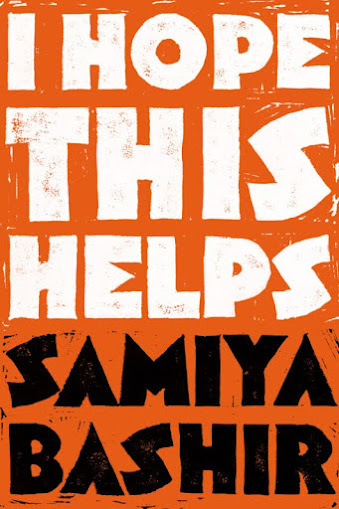Samiya Bashir, I Hope This Helps
I’m the eldest child ofan eldest child. I spent most of my little years surrounded by grown-ups whotalked about grown-up things and lived their grown-up lives all while I —silent and usually unseen — watched, listened. Strong sense memory stories includean embrace of quiet invisibility and its helpmate: piping up to go along forthe ride. I’d slip across a back seat and disappear into overhearing.
To grow up was to knowall the ways to catch snatches of things that I wasn’t supposed to know yet.(“OVERHEARD”)
 I’mreally struck by “poet, writer, librettist, performer, and multi-media poetry maker” Samiya Bashir’s I Hope This Helps (New York NY: Nightboat Books,2025), a dynamic and expansive book-length polyvocality of and around resistance,memory, literature and utterance. “listen: // we ain’t all well,” begins thepoem “PER ASPERA,” a poem that helps open the collection, “this world / spinsdesigns / which madden / us shape us / like dough / bake us crisp [.]” Bashiris very much a poet who works in sentences that build upon each other towards aparticular sequence of narrative truths or surrounding theses or comprehensionsin a propulsive and self-aware syntax. As the poem “I DON’T KNOW, DO I?”begins: “So I wake up to news that they took Sid to the Düsseldorf emergy roomin the middle of the night. / I’m not being honest about something. It onlytook two sentences to lie.” These poems are powerful, attempting a self-awarehonesty, as well as the difficulties of attempting such openness, working on howthings might improve, how the self might improve, and just how necessary bothare required for the sake of the other. As the extended poem “OVERHEARD”continues: “Thing is: / structures aren’t forever, / needn’t be — for me, atleast — shouldn’t be.” Or, two pages further: “I don’t usually write very welleither. But the Muse Industrial Complex makes certain guarantees. The more Iwrite, the more some things make sense — even if only to me; and if I’m honest,most of the world seems completely senseless, even if only to me.”
I’mreally struck by “poet, writer, librettist, performer, and multi-media poetry maker” Samiya Bashir’s I Hope This Helps (New York NY: Nightboat Books,2025), a dynamic and expansive book-length polyvocality of and around resistance,memory, literature and utterance. “listen: // we ain’t all well,” begins thepoem “PER ASPERA,” a poem that helps open the collection, “this world / spinsdesigns / which madden / us shape us / like dough / bake us crisp [.]” Bashiris very much a poet who works in sentences that build upon each other towards aparticular sequence of narrative truths or surrounding theses or comprehensionsin a propulsive and self-aware syntax. As the poem “I DON’T KNOW, DO I?”begins: “So I wake up to news that they took Sid to the Düsseldorf emergy roomin the middle of the night. / I’m not being honest about something. It onlytook two sentences to lie.” These poems are powerful, attempting a self-awarehonesty, as well as the difficulties of attempting such openness, working on howthings might improve, how the self might improve, and just how necessary bothare required for the sake of the other. As the extended poem “OVERHEARD”continues: “Thing is: / structures aren’t forever, / needn’t be — for me, atleast — shouldn’t be.” Or, two pages further: “I don’t usually write very welleither. But the Muse Industrial Complex makes certain guarantees. The more Iwrite, the more some things make sense — even if only to me; and if I’m honest,most of the world seems completely senseless, even if only to me.” Thereis something to her text that offers, also, an echo to the structuralcounterpoint of Susan Howe collections [the most recent collection I reviewed was Spontaneous Particulars: The Telepathy of Archives (Christine BurginBooks/New Directions Books, 2014), although there are rumours of a new title this fall]—providing that opening prose essay blending research and memoiragainst counterpoint of poems set as phrase-collage—as Bashir employs a similarback-and-forth of deep research and first-person exploration againstcollage-phrases, but one set as a larger and singular ongoing structure. Bashirwrites a shifting font and font-size, writing straight and narrow andimpossibly large, providing a layering of text and volume as well as image,everything collaged together to provide a far broader experience of reading; ofexperiencing the text-as-performance, and the performance as absolute. Moving throughreferences to abusers, masks and darkness, Ezra Pound and apology, musicalscores, cartography, the Library at Alexandria, accusation, sadness, woodcutimages and memoir, this collection is masterful, propulsive in its urgency andin its agency, writing out survival across multiple forms and genres.
GREENWICH MEANS
pressured
forced — shoved
from what is to
what should
enemy of presence
carrier of stress
illness delivery system
like something that came
with slavery like a lie
we insist on
an old tomorrow
another yesterday
not always on time notalways
when called not
an appointment
anti-response topresence
opposite
o’clock



